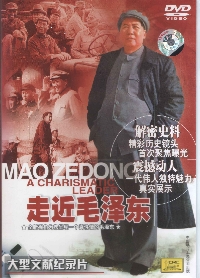
Illustration:
ill. 0.4 a (set: 0.4)
Date:
2003
Genre:
DVD cover, film
Material:
photograph, colour, original source: DVD cover, colour
Source:
DVD: Mao Zedong A Charismatic Leader, Private copy/photograph, 2003.
Courtesy:
Barbara Mittler
Inscription:
大型文献纪录片 走近毛泽东 全新视角为您呈现一个真性情的毛泽东 解密史料 精彩历史镜头 首次聚焦曝光 震撼动人 一带伟人独特魅力真实展现
Keywords:
Mao Zedong, red sun, sun, hero, mass culture, Popstar Mao, music, film, Mao Fever, Mao Cult, Mao memories, Mao portrait, nostalgia, leader, contemporary China
Popstar Mao (Liuxing Mao 流星毛)
What is it that makes Mao Zedong and the propaganda products accompanying his period of reign in China attractive? Why is it that present-day Chinese politics and the everyday experience of life in China, is determined by this very propaganda? Jung Chang 张戎 (1952–) in her voluminous biography of Mao entitled Mao: The Unknown Story (Chang and Halliday 2005) nowhere addresses this issue. Mao, the main figure in her book, was a political leader who led his Party comrades, and then the entire country, through a series of cataclysms. Yet Mao, the “monster” whom she depicts, is not the only relevant Mao to contemporary China; he remains, for many, the symbol of an egalitarian, altruistic past, a past which has only recently been buried with the victory of “socialist capitalism.” This is why Mao appears as a star in many blockbuster movies and pop songs as can be seen here, why he can function (with his successors Deng Xiaoping 邓小平 (1904–97) and Jiang Zemin 江泽民 (1926–) as a New Year’s god, and why he can serve as a talisman for taxi drivers, hanging from their mirrors (see ill. 5.77 and ill. 5.76).








